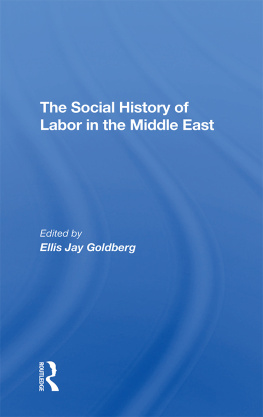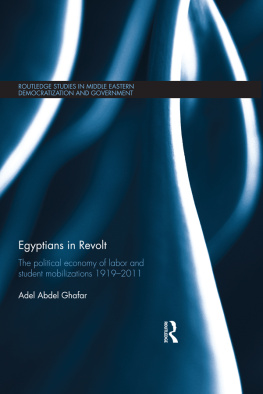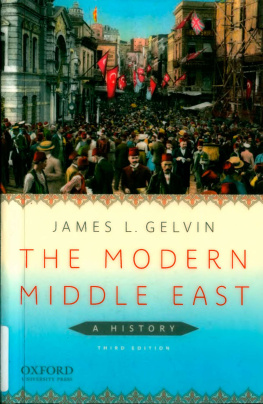THE SOCIAL HISTORY OF LABOR IN THE MIDDLE EAST
The Social History of the Modern Middle East
SERIES EDITOR: EDMUND BURKE III
This series seeks to provide a forum for historically grounded studies on the Middle East in a broad, interdisciplinary context. New research has challenged tacit acceptance about how the Middle East came to modernity and has enlarged our understanding of the complex changes in the region over time and their impact on people and popular culture. By focusing on the nuances of everyday life and the experiences of noneliteswomen, workers, peasants, and minoritiesstereotypes about what it means to be Arab and Islamic can be challenged and broken down. Far from being a "history with the politics left out," a social history of the Middle East provides a way of reinterpreting the political history of the region, including the development of nationalism and the so-called Islamic revival.
The Social History of Labor in the Middle East
edited by Ellis Jay Goldberg
FORTHCOMING
The Social History of Cities in the Middle East
edited by Peter Sluglett
A Social History of Women and the Family in the Middle East
edited by Margaret Lee Meriwether and Judith Tucker
The Social History of Labor in the Middle East
edited by
Ellis Jay Goldberg
University of Washington
First published 1996 by Westview Press, Inc.
Published 2019 by Routledge
52 Vanderbilt Avenue, New York, NY 10017
2 Park Square, Milton Park, Abingdon, Oxon OX14 4RN
Routledge is an imprint of the Taylor & Francis Group, an informa business
Copyright 1996 Taylor & Francis
All rights reserved. No part of this book may be reprinted or reproduced or utilised in any form or by any electronic, mechanical, or other means, now known or hereafter invented, including photocopying and recording, or in any information storage or retrieval system, without permission in writing from the publishers.
Notice:
Product or corporate names may be trademarks or registered trademarks, and are used only for identification and explanation without intent to infringe.
Library of Congress Cataloging-in-Publication Data
The social history of labor in the Middle East / edited by Ellis Jay
Goldberg.
p. cm. (The social history of the modern Middle East)
Includes index.
ISBN 0-8133-8495-8 (hc). ISBN 0-8133-8498-2 (pb)
1. Working classMiddle EastHistory. I. Goldberg, Ellis.
II. Series.
HD8656.S63 1996
305.5'5'0956dc20 95-45132
CIP
ISBN 13: 978-0-367-29583-7 (hbk)
Contents
, Ellis Goldberg
, Donald Quataert
, Gnseli Berik and Cihan Bilginsoy
, Valentine M. Moghadam
, Elisabeth Longuenesse
, Michael Shalev
, Ellis Goldberg
, Claude Liauzu
Guide
It is crucially important for Americans to get beyond the essentialist stereotypes about Islam and Middle Easterners that have tended to obscure our understanding of the region and its peoples. Over the past decades, important new perspectives have become available on the modern Middle East. The old paradigms, rooted in modernization theory and the emergence of nationalism in the region, are giving way to more complex understandings grounded in social and cultural history.
The field of Middle Eastern studies has formerly been preoccupied with the state and elite groups and has utilized official documents and literary sources. More recently, researchers have increasingly focused upon the experiences of noneliteswomen, workers, peasants, and ethnic minorities and drawn upon new sources or have devised new strategies for rereading the old ones. This process is still continuing, but already the outlines of a new social history are visible. In this moment of intellectual transition, a series devoted to the social history of the Middle East has much to contribute.
In an effort to provide a measure of coherence to the mainstreaming of social history across the disciplines, The Social History of the Middle East series focuses on historically grounded social science research on the Middle East. History is seen as a broad interdisciplinary space within the social sciences, a zone of convergence between anthropology politics, sociology, and history rather than as a particular academic discipline. The purpose of the series is to stimulate and focus methodological reflection and scholarship on topics of importance to the Middle Eastern field and to make more widely available the research of a new generation of scholars.
Often new scholarly debates take place in hard-to-find specialized journals, and their findings are slow to make their way into the mainstream. Scholars tend to address one another, using specialized languages that are not widely understood by a general audience. Within the field, research has proceeded unevenly across the region, and scholarship has tended to develop within the confines of national literatures. As a result, scholars working on similar topics but in different countries are often unaware of one another's work. Research on Middle Eastern workers, women, and the family, or urbanism, has thus been slow to find its way into textbooks.
By providing a convenient summary of up-to-date research together with useful bibliographies on important topics, the series facilitates the wider dissemination of new work on Middle Eastern culture and society. The volumes in the series are designed to supplement courses at the upper division and graduate levels not only in modern Middle Eastern history but in anthropology, politics, and sociology. Whereas the coverage will vary, each volume will survey the region broadly, from the Maghreb to the Hindu Kush. All volumes will contain chapters on Turkey, Egypt, and Iran, the three most populous countries in the region.
Edmund Burke III
An edited book acquires many debts. I am grateful to Professor David Olson, who as the Harry Bridges Professor of Labor Studies helped to make it possible for Valentine Moghadam and Michael Shalev to come to the University of Washington. I also wish to extend my warmest thanks to Professor Joel Migdal of the Institute for International Studies, who provided additional funds for Moghadam's and Shalev's visits as well as helped Donald Quataert come to the University of Washington. The Jewish Studies Center and Middle East Center also provided support for Shalev's trip.
I cannot express fully enough my thanks to the colleagues who contributed to this book There was neither a conference nor the promise of financial reward. They all undertook the obligation of writing lengthy, original articles with a wonderful spirit of scholarly generosity and dedication. Then, in response to questions and comments, they wrote them again.
Terry Burke first suggested this project to me several years ago, and it has been a truly rewarding undertaking. I have benefited from discussions with him about this and other projects and from his engaging responses to the essays as they came in. In the course of editing this book, other projects have intervened that helped me to broaden my thinking. In 1992 the Department of Near Eastern Studies at Princeton invited me to give a talk on the history and historiography of Egyptian labor, which helped to clarify my own thinking on many relevant issues. For numerous discussions that have deeply enriched my understanding, I would like to thank Ahmad Abdulla, Mai Ghoussoub, Resat Kasaba, Kanan Makiya, Chibli Mallat, Joel Migdal, Hazem Saghiyah, and Bob Vitalis. Jere Bacharach, Margaret Levi, Joel Migdal, and Robert Tignor were kind enough to read and comment on portions of the book.






